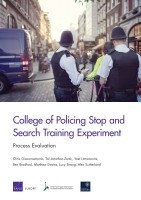| 来源类型 | Research Reports
|
| 规范类型 | 报告
|
| DOI | https://doi.org/10.7249/RR1442
|
| 来源ID | RR-1442-COP
|
| College of Policing Stop and Search Training Experiment: Process Evaluation |
| Chris Giacomantonio; Tal Jonathan-Zamir; Yael Limanovitz; Ben Bradford; Matthew Davies; Lucy Strang; Alex Sutherland
|
| 发表日期 | 2016
|
| 出版者 | RAND Corporation
|
| 出版年 | 2016
|
| 页码 | 112
|
| 语种 | 英语
|
| 结论 |
Despite general agreement about the goals of the training, there was a lack of clarity about how they were to be achieved.- The evaluation found that while there was general agreement amongst national stakeholders and training designers on the high-level goals of the training — improving stop and search practice, reducing levels of race disproportionality and decrease the overall use of stop and search powers, there was a lack of clarity about how these goals were to be achieved in practice. Nevertheless, the trainers provided a 'good-faith', if varied interpretation of the training, focusing on improving practical legal decision-making and improving recording of 'reasonable grounds' for conducting a search.
A number of substantial implementation issues were identified with the training.- These included the use of guidance rather than a manual for training delivery, differences of opinion on the definition of a 'fair and effective' search, and the new guidance on the smell of cannabis being insufficient to justify a search.
Officers attending the training were largely positive about it, despite concerns about some of its content.- Participants were mostly positive about the format of the training and quality of the trainers, although many had reservations about the definition of a 'fair and effective' search and perceived changes to 'reasonable grounds' for a search. In observation of 30 shifts across the six participating forces, officers appeared to follow the correct stop and search process in most cases. It was found that officer behaviour was related to the characteristics and demeanour of suspects; on the other hand, procedurally fair officer behaviour was associated with a positive change in suspect attitudes during encounters.
|
| 摘要 |
- For national roll-out, a clear and unambiguous statement of purpose for the training needs to be developed and successfully communicated to all stakeholders in advance of the training.
- Core skills that are important for stop and search appear to be connected to the wider skills needed for better-quality police encounters with the public.
- Officers' acceptance of the training messages could be improved if there were explicit middle- and high-ranking support for the messages within each force.
- If the 'fair and effective' definition is retained, trainers will require specific tools to communicate and teach it.
|
| 主题 | Civil Rights
; Crime
; Law Enforcement
; Program Evaluation
; United Kingdom
|
| URL | https://www.rand.org/pubs/research_reports/RR1442.html
|
| 来源智库 | RAND Corporation (United States)
|
| 引用统计 |
|
| 资源类型 | 智库出版物
|
| 条目标识符 | http://119.78.100.153/handle/2XGU8XDN/108307
|
推荐引用方式
GB/T 7714 |
Chris Giacomantonio,Tal Jonathan-Zamir,Yael Limanovitz,et al. College of Policing Stop and Search Training Experiment: Process Evaluation. 2016.
|
|
文件名:
|
x1495316298375.jpg
|
|
格式:
|
JPEG
|

|
文件名:
|
RAND_RR1442.pdf
|
|
格式:
|
Adobe PDF
|
除非特别说明,本系统中所有内容都受版权保护,并保留所有权利。